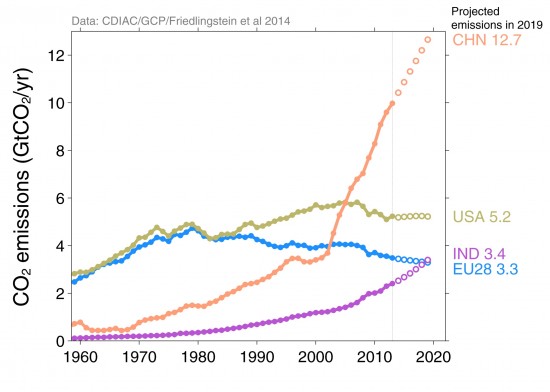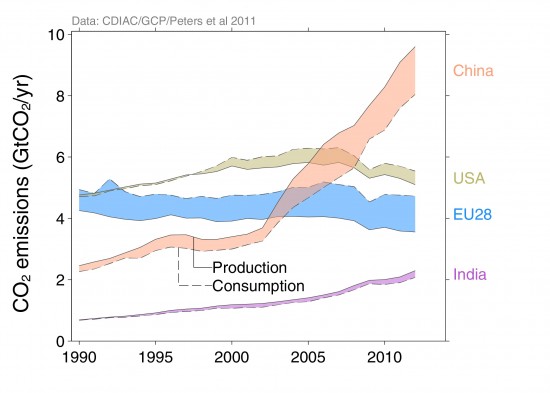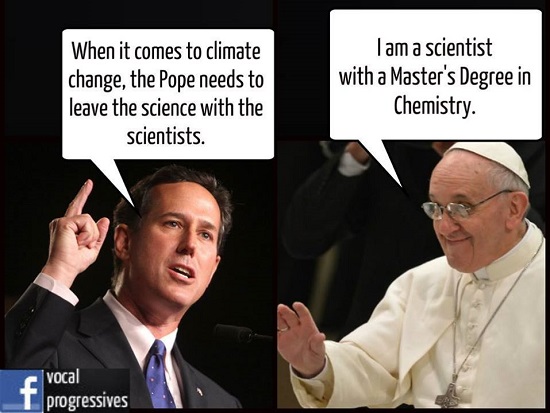1. Charts to understand climate change
Shrink That Footprint has published 11 charts to help understand climate change. Here are two of them. First, the emissions trajectory of the big four:

Plenty to worry about but some virtue seems to accrue to the Europeans. Yet the Europeans benefit most by having the goods they consume produced elsewhere:

2. India’s heat wave continues
-
A searing and continuing heat wave in India has so far killed more than 2,300 people, making it the 5th deadliest in recorded world history.
If the death toll reaches more than 2,541, it will become the 4th deadliest heat wave in the world, and the deadliest in India’s history.
People are starting to blame climate change. The experts are cautious. Michael Mann says that rather than look at the attribution of any single event ” the fact that we are seeing unprecedented heat like this is attributable to human-caused climate change”.
I understand the heat has now abated.
3. Republican presidential candidates on climate change
Seven candidates are basically climate deniers:
- Marco Rubio says “there’s no consensus” on that science. Ted Cruz says people who believe in climate change are like “flat-Earthers.” Rand Paul has said the idea that humans cause climate change is “alarmist stuff,” and Ben Carson once said “We may be cooling.” Carly Fiorina; Mike Huckabee; Rick Santorum — all have expressed heavy to mild denial of the overwhelming scientific evidence that says humans cause climate change.
Of the remaining two, New York governor George Pataki apparently has no chance of becoming the presidential candidate. That leaves Senator Lindsey Graham, ninth and last cab off the rank. He believes that global warming is “real,” and that “man has contributed to it in a substantial way”, but he has also said that climate change has been “oversold” and over-hyped.
Sigh!
Go Hillary!
4. Is the Pope a scientist?
One GOP candidate, Rick Santorum, said the Pope should stick to morality, theology and stuff he’s good at and leave climate change to the scientists. There’s a story around that the Pope has a masters degree in chemistry:

Actually he doesn’t, he only studied chemistry at school.
Policy.Mic reports that a recent survey of GOP voters put Santorum at 4%, good for ninth place. Obviously he needs divine intervention.
- On June 16, Pope Francis is expected to release an encyclical letter on the environment, the Catholic Church’s strongest statement to date on the moral issues associated with climate change.
We look forward to it.
5. People on the move
- In record numbers, people are escaping regions plagued by warfare, instability, disasters, poverty, or systemic persecution. The United Nations announced last year that forced displacement had topped 50 million globally, and early tracking indicates that number may increase yet again this year. Multiple crises worldwide are driving the record migrations, which include Africans and Middle Easterners entering Europe, Rohingya Muslims fleeing Burma, Central Americans traveling to the U.S., civilians escaping violence in Syria, Yemen, Burundi, Somalia, Iraq, and more—all undertaking risky journeys to find better lives.
The Atlantic has a series of photos documenting people on the move.
Climate change is not mentioned, but I’d bet it is a factor. In any case I expect this is but a foretaste of what is to come not many decades hence.
6. Australia cops a grilling on climate policy
- Australia was grilled over its emissions reduction target at a UN climate change meeting in Germany with nations including South Africa and China asking about the fairness of our commitment to reduce emissions by 5 per cent by 2020.
Meanwhile former UN secretary-general, Kofi Annan, has also taken aim at Australia, saying it’s become a climate change ‘free rider’ and is no longer taking ‘credible’ action to curb greenhouse gas emissions.
Annan also called us a “villain” along with Canada and Japan.
If you like you can read what Greg Hunt and Tony Abbott said in response, but I’m sure you’ve heard it all before. Instead read Giles Parkinson at RenewEconomy.
7. Paris climate pledges ‘will only delay dangerous warming by two years’
Climate Tracker has found that the pledges made by 36 countries so far in relation to the December Paris conference will only delay dangerous climate change by two years. We’ll get to 2°C by 2038 instead of 2036.
More than 150 countries, including Australia, are yet to submit their pledges.
When the UN Framework Convention on Climate Change (UNFCCC) was set up 21 years ago atmospheric concentration of CO2 was 300 ppm. Now it’s 400 ppm.
Paris will succeed, it seems, by shifting the goalposts:
- Paris will be successful if countries agree to establish a durable and flexible framework that sends a strong signal to business, communities and investors that a zero-emissions economy is inevitable.
This Reuters piece says Paris could be the graveyard for the 2°C goal, a burial without a body. But small island states are not going to go quietly. More than 100 developing countries want a 1.5°C goal. They could block an inadequate deal.
8. Panasonic signs battery storage deal with 3 Australian utilities
- Japanese electronics giant Panasonic has struck agreements with three Australian energy utilities to trial its home-based battery storage options, saying it would help double the amount of self-consumption of Australian solar households and also challenge utilities to change their business models.
Panasonic has agreed on trials with Red Energy, the retailing arm of the mostly NSW government-owned Snowy Hydro, along with Queensland regional network operator and retailer Ergon Energy, and the ACT-based utility ActewAGL.
See also how Panasonic battery storage will force utilities to change business models.


Interestingly enough some people think that a contributing cause of conflict and refugee numbers is the effect of US and EU quotas on biofuels. These quotas diverted corn in particular from feeding people to producing biofuels – result was increases in the price of grain which caused unrest, war and the movement of people.
See here for more on the impact of biofuel production
John, that’s a good article but it dates from 2008. I wonder if policy has changed at all in the US and the EU. I haven’t read anything about biofuels for a long time!
Brian: As far as I know nothing much has changed in terms of US and EU quotas. Part of the problem is the lobbying power of the corn growers in the US. The biofuel research establishment is also a bit to get away from no mater what you google.
As you know I think non-bio low impact renewable fuels are he way to go
Even Christine Milne said the Arab spring was due to climate change.
In hindsight, I don’t think so.
There’s an interesting talk broadcast – and podcast too – about engineering climate change on ABC RN. http://www.abc.net.au/radionational/programs/bigideas/engineering-a-cooler-planet/6495526
I remember the Soviet Union had a plan, when I was a teenager, to park mirrors in geostationary orbits so as to keep some of the major Siberian rivers, part of the Northern coast as well as Arkhangelsk and Murmansk completely ice-free.
“Correction: Plants Will Not Flourish as the World Warms” –
http://scikon.animekon.com/news-106489.html